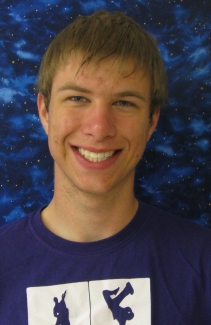Bryce Bjork’s talk entitled “Direct Measurement of OD+CO-> cis-DOCO, trans-DOCO, and D+CO2 Branching Kinetics using Time-Resolved Frequency Comb Spectroscopy” was selected by a panel of judges at the International Symposium on Molecular Spectroscopy as one of three winners of the 2017 Rao Prize. The prize will be presented to Bjork at the June 2018 Symposium.
In addition, Bjork was asked to serve as a judge in the 2018 Rao Prize competition. If he is able to attend next year’s Symposium, his registration fee will be waived and he will receive an up-to-six nights’ stay at the four-bedroom suite rate.
“There were many superb talks, but yours was exceptional,” said Gary Douberly, Chair of the 2017 Rao Prize Committee, in a recent letter to Bjork informing him of his selection. “We hope that this prize represents the beginning of what we expect will be a distinguished career in science.”
Rao Prize winners and their co-authors are invited to submit articles based on their talks to the Journal of Molecular Spectroscopy. When published, the article will appear in the journal with a caption linking the paper with the symposium talk that won the Rao Prize.
“The prize is given to graduate students,” said Jun Ye, Bjork’s advisor at JILA. “But, it usually signifies the beginning point of a young spectacular scientific career in the field of molecular spectroscopy.”



 The Physics Frontiers Centers (PFC) program supports university-based centers and institutes where the collective efforts of a larger group of individuals can enable transformational advances in the most promising research areas. The program is designed to foster major breakthroughs at the intellectual frontiers of physics by providing needed resources such as combinations of talents, skills, disciplines, and/or specialized infrastructure, not usually available to individual investigators or small groups, in an environment in which the collective efforts of the larger group can be shown to be seminal to promoting significant progress in the science and the education of students. PFCs also include creative, substantive activities aimed at enhancing education, broadening participation of traditionally underrepresented groups, and outreach to the scientific community and general public.
The Physics Frontiers Centers (PFC) program supports university-based centers and institutes where the collective efforts of a larger group of individuals can enable transformational advances in the most promising research areas. The program is designed to foster major breakthroughs at the intellectual frontiers of physics by providing needed resources such as combinations of talents, skills, disciplines, and/or specialized infrastructure, not usually available to individual investigators or small groups, in an environment in which the collective efforts of the larger group can be shown to be seminal to promoting significant progress in the science and the education of students. PFCs also include creative, substantive activities aimed at enhancing education, broadening participation of traditionally underrepresented groups, and outreach to the scientific community and general public.